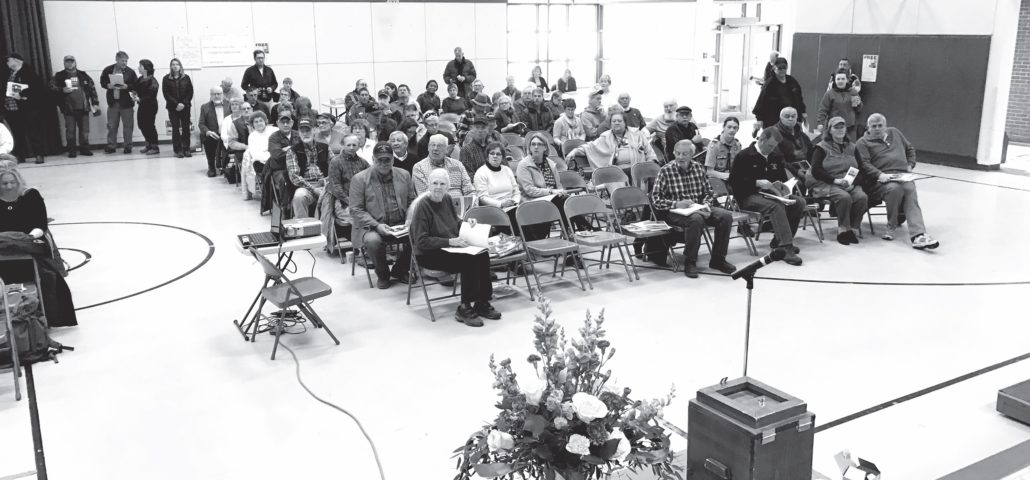At a special meeting March 2, spokespeople for the Vassalboro Sanitary District (VSD), the Vassalboro Volunteer Fire Department and the Vassalboro First Responders told select board members how they would use federal American Rescue Plan Act (ARPA) funds if they got some.
Select board members made no decisions. Renewed discussion is tentatively scheduled for their March 17 meeting.
They reminded everyone that ARPA funding is probably a one-shot deal. Vassalboro has received $231,692.56, according to Town Manager Mary Sabins, or a little over half of its $461,000 appropriation. She expects the rest by early this fall.
Engineer Stephen Green spoke for the VSD, with the mostly-silent support of the entire board of trustees. Top priority, Green said, is fixing most if not all of the 72 manholes in Vassalboro streets and roads.
The manholes date from the 1980s, he said. The supporting walls are brick-and-mortar, with the mortar deteriorating so that many of the manhole covers have sunk below the pavement level. He said about one-third of the manholes have been inspected; 90 percent of those inspected need repair.
Green estimated about 30 manholes are on Route 32 (Main Street) and have been “pounded the worst” by comparatively heavy traffic. They have generated many complaints to VSD officials, the town office and the select board.
Route 32 is a state highway. Green said he is waiting to hear from state officials whether the VSD can cut into the pavement to make repairs.
VSD officials are already planning the manhole work. Green’s current cost estimate is $250,000. He believes the work qualifies for ARPA money under the category of wastewater infrastructure, and said the VSD has access to some matching money.
After funding is obtained, Green expects the work to take at least six months, two to award a contract and four for construction.
VSD officials gave selectmen a list of lower-priority projects several weeks ago, and Green briefly summarized them: installing bulk tanks to hold odor control chemicals at pump stations, repairing the office building, paving access ways, adding water at the pump stations (to wash pumps) and perhaps, if there is renewed demand, extending sewer lines.
Sabins calculated the total VSD request at more than $2.2 million, far in excess of expected ARPA funds.
Fire Chief Walker Thompson’s priority is replacing Scott air packs for department members. If he were to get 20 new ones in a single year, Sabins pegged the cost at over $163,000. Thompson talked about spreading the purchases over two years and buying 16 rather than 20.
Thompson’s second priority is stipends for firefighters who continued to work through the pandemic. He recommended allocating any money on a per-call basis.
Rescue Chief Dan Mayotte said his top priority is buying 11 new AEDs (Automatic External Defibrillators). The unit’s current AEDs are failing one by one, and they’re so old replacement parts are no longer available.
He would also like money for ENVO masks (reusable N95 masks) for volunteer firefighters and other town employees and volunteers who regularly interact with the public, and a $10,000 fitness test machine to go with the masks. Sabins said all town employees are considered essential workers and all deal directly with the public at least part of the time.
Training funds would also be useful, Mayotte said, and his volunteers would appreciate stipends.
Sabins had estimated the First Responders total request at almost $70,000.
Sabins suggested an electronic sign for the town office dooryard to help keep residents informed of upcoming events. She had a cost estimate of $30,000 to buy and install a sign, based on the cost of the new one at Vassalboro Community School.
At the March 3 select board meeting, member Chris French suggested using part of the second half of the ARPA money for a second sign at the Riverside Fire Station on Riverside Drive (Route 201).
Other suggestions that might be eligible for ARPA money included repairs to the China Lake outlet dam in East Vassalboro; a Zoom or similar system that would allow residents to view select board meetings from home; and a donation to Waterville-based Delta Ambulance.
ARPA regulations explained
The federal regulations for using ARPA funds, approved by the Secretary of the Treasury and effective on April Fools’ Day, 2022, are in a two-inch thick blue binder that Town Manager Mary Sabins brought to the select board’s March 2 discussion.
Inside are 437 pages of mostly single-spaced typing. The stated purpose is to “implement the Coronavirus State Fiscal Recovery Fund and the Coronavirus Local Fiscal Recovery Fund” established by Congress.
The document has no table of contents, no index and no definitions section.
The introduction says that the document is supposed to explain what ARPA money can be used for and how to apply for it. It notifies people that “each eligible use category has separate and distinct standards for assessing whether a use of funds is eligible.”
Applicants need to figure out which category their intended expenditure fits into, and then decide whether the expenditure meets that category’s standards.
Furthermore, “In the case of uses to respond to the public health and negative economic impacts of the pandemic, recipients should also determine which sub-category the eligible use fits within (i.e., public health, assistance to households, assistance to small businesses, assistance to nonprofits, aid to impacted industries, or public sector capacity and workforce), then assess whether the potential use of funds meets the eligibility standard for that sub-category.”
Parts of the document describe eligible uses; other parts list restrictions on uses. Some restrictions apply only to some types of government.
Types of government are listed as “state, territory, Tribal government, county, metropolitan city, nonentitlement unit of government.” Sabins said the last category means small towns like Vassalboro.
The document says federal officials do not preapprove ARPA expenditures. Vassalboro Select Board Chairman Robert Browne has explained that Vassalboro spends the money, then submits the bill. If it is rejected, the town pays.
 by Mary Grow
by Mary Grow


 by The Town Line staff
by The Town Line staff


